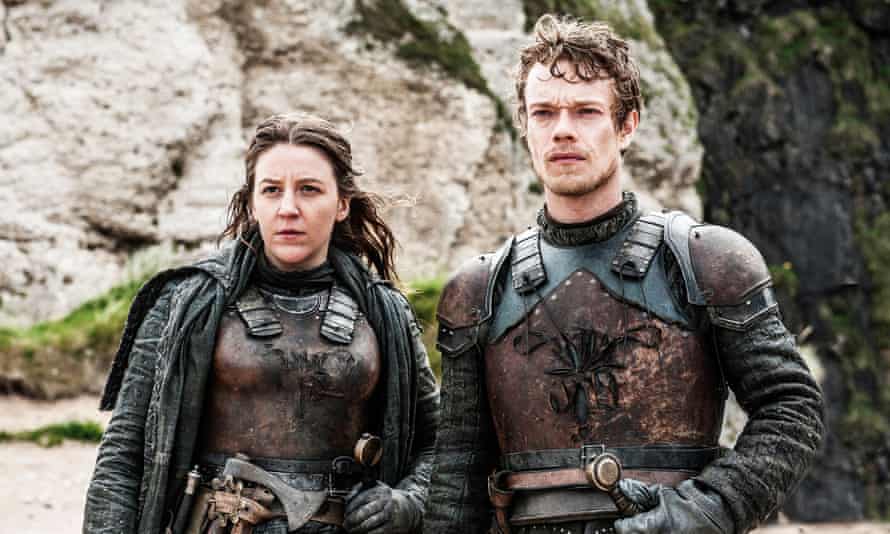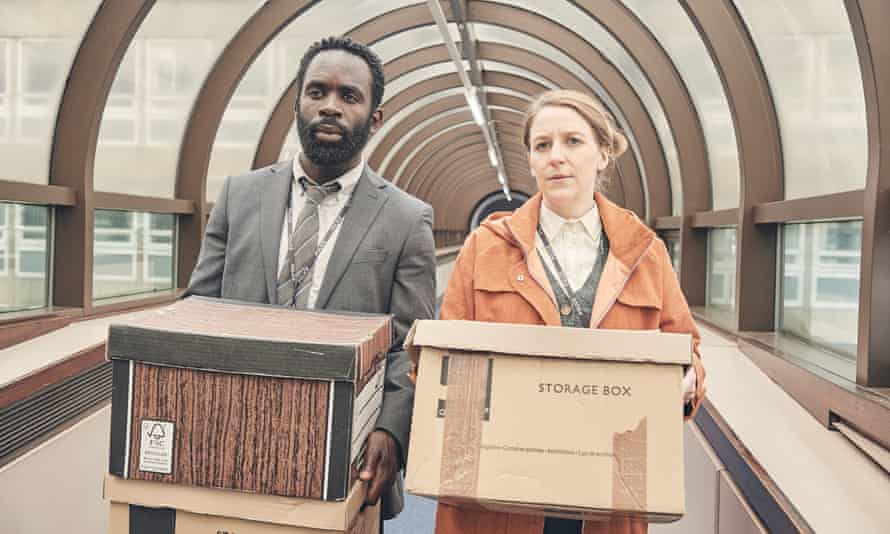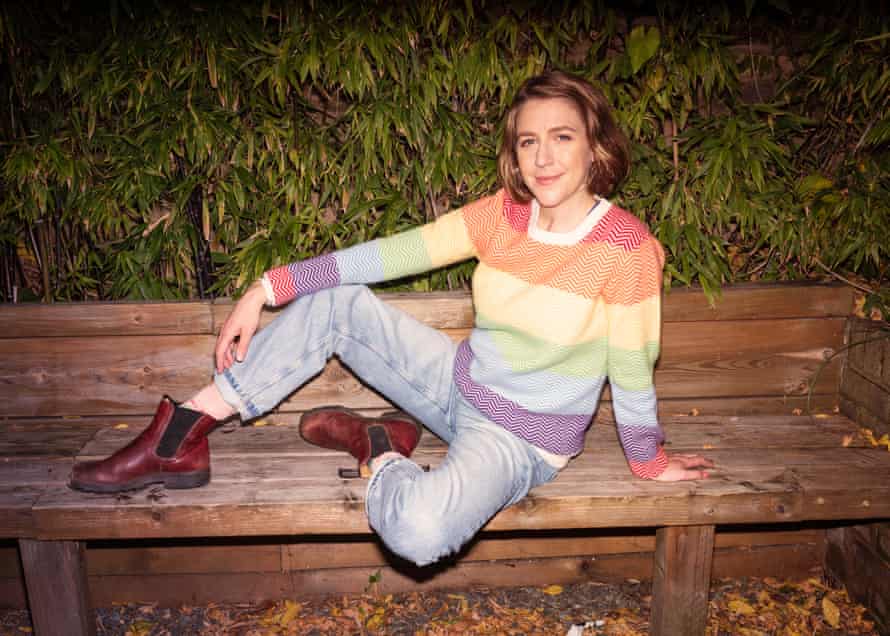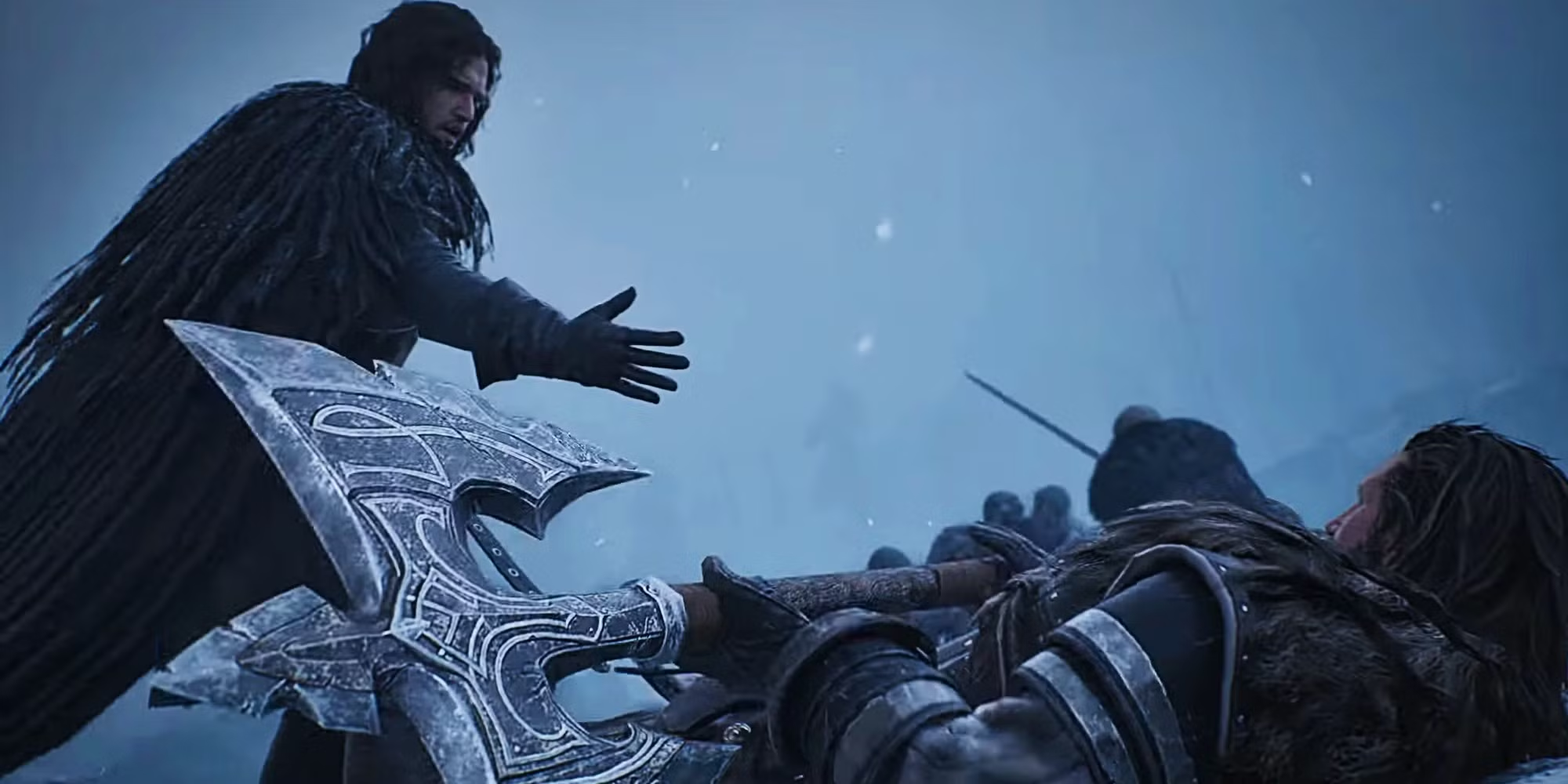Deadlines meant I saw ITV’s twisty police corruption drama The Tower as a rough cut, featuring on-screen notes about final editing perfections, computer-generated backgrounds, extra lines of dialogue – and the instruction: “Hide pregnancy bump.”
This related to the increasing evidence of Freddie, now four weeks old, and sleeping between feeds in a pub garden near the London home of his mother, Gemma Whelan, who is amused to hear of this prenatal technology. “Wow!” she says. ‘“How are they going to do that? Paint it out? Or cut in a waistline from earlier?”
Despite high-level acting credits – including Yara Greyjoy in Game of Thrones and Kate in BBC Two’s Upstart Crow – the 40-year-old says she is never recognised in the street: “People sometimes say, ‘Do I know you from the bus stop?’ or, ‘Were we at school?’ That’s it really.”
Whelan enjoys her ability to transform into her her characters, whether with Yara’s breastplate, war paint and mouthy scowl – “it would be almost insulting to be recognised from Game of Thrones” – or, in BBC One’s The Moorside, as Karen Matthews, the Yorkshire woman jailed for faking the abduction of her daughter, so physically transformed that it fooled Whelan’s mum. “She said: ‘Strange they used so much original footage of her!’, and I said: ‘That’s all me, Mum. There is no original footage.’”

Whelan is taking minimal maternity leave partly because she is self-employed but also because, like most actors, she endured a year during lockdown of not doing very much. A West End version of Upstart Crow was shut down three weeks into the run, after which she spent “a year doing audiobooks and voiceovers”. She then filmed next year’s second series of BBC One’s Gentleman Jack – playing Marian, the sister of Anne Lister – before The Tower.
The main shoot lasted through the second trimester. With actors who are visibly pregnant when their characters are not, the convention has been to shoot them mainly from the neck up. “Yeah. It’s a great way of getting loads of closeups!” laughs Whelan who, during the final season of Game of Thrones, was carrying Frances, now four. “But there also were a lot of wide shots in The Tower. I think you’d only notice if you knew I was pregnant and, if you do notice, women have babies, who cares? It was refreshing to be able to not worry about it.”
Whelan’s domestic juggling starkly contrasts with DS Sarah Collins in The Tower, who has no visible private life. “She’s very moral, very black and white. There’s very little nuance in her judgment.” Viewers may be reminded of Adrian Dunbar’s Supt Ted Hastings in Line of Duty, and Whelan admits the similarity: “Absolutely. They swore an oath to keep the law and so they do. She doesn’t care about being a people-pleaser, which I think a lot of women are written as – and, actually, a lot of women are – but I like that she’s very front-footed and doesn’t mind pissing people off.”
Adapted by 24 screenwriter Patrick Harbinson, from a series of novels by former Met detective Kate London, The Tower goes out at a time when, after the murder by a serving police officer of Sarah Everard, the reputation of the force is as low as it’s ever been. But, like Line of Duty, The Tower shows good and bad policing. “Yes. Exactly,” says Whelan. “Most of the cops are trying to do their best, but some aren’t; there are wrong ’uns.”
As with all current TV productions, The Tower had a Covid-safe set, with testing mandatory and jabs encouraged – a difficult decision for Whelan at a time when medical evidence on safety during pregnancy was sketchy. Stressing that she is not telling others what to do but sharing her own thought processes in a dilemma that many face, she says: “I’m double-vaxxed, and had both while I was pregnant. I spoke to the midwife and doctors at length, and read all the stories about the huge number of American pregnant women who had been jabbed without incident. And I knew if I got Covid in the third trimester it could be very serious. It’s not an easy decision but I felt comfortable to make it and we’re both fine.”

Another question of film-set safety has arisen since the revelations about Harvey Weinstein and other showbiz predators. Whelan says that she has never experienced any threats or assaults, but the mood of shoots has noticeably changed. “There’s a very different choice of language now. If anyone makes an innuendo, everyone shuts down. I think, five or 10 years ago, if there was a double entendre, everyone would jump on the bandwagon and see how many laughs they could raise. I remember when an actor would have a microphone fitted, and sometimes you have to root around the waist. And, in the past, there’d be all this, ‘and while you’re down there, hur, hur!’ But now you don’t have to play along with things like that.”
In the past, it was common for actors, saying hello or goodbye to colleagues, to exchange embraces of a level some married couples never reach. But first #MeToo and then Covid-19 have ended that. “All the squishy-squishy, huggy-huggy stuff has stopped. But I don’t miss it. You have to be a bit more genuine now if you’re saying hello. You can’t hide behind a big hug. And there’s no question mark over it: Do we double kiss? Do we hug? Clasp hands? No, we just say hello to each other.”
Although DS Collins’s workaholism prevents her having sex in The Tower, an intimacy director is credited for couples who do. Presumably, when Whelan was playing the energetically bisexual Yara in Game of Thrones, actors were just left to get on with it?
“Almost literally. They used to just say, ‘When we shout action, go for it!’, and it could be a sort of frenzied mess. But between the actors there was always an instinct to check in with each other. There was a scene in a brothel with a woman and she was so exposed that we talked together about where the camera would be and what she was happy with. A director might say, ‘Bit of boob biting, then slap her bum and go!’, but I’d always talk it through with the other actor.”

In the 2012 second season (her first) of Game of Thrones, Yara and Theon (Alfie Allen) had one of TV’s most talked-about sex-scenes (retrospectively revealed to be incestuous) sharing a horse-ride including a reach-round move that would bring immediate disqualification in dressage. “Alfie was very much, ‘Is this OK? How are we going to make this work?’ With intimacy directors, it’s choreography – you move there, I move there, and permission and consent is given before you start. It is a step in the right direction.”
With Yara, Shakespeare’s Kate, and now DS Collins, Whelan has repeatedly played spectacularly strong women. “That seems to be what casting directors see in me.” Possibly because there is something sharp and sardonic about her? “Maybe. I think I may give off a ‘don’t fuck with me’ vibe. There’s definitely a defiance.” And has that always been there? “My mum says I’ve always been astonishingly wilful and stubborn. But it seems to come out more in the acting. In real life, I’m quite apologetic, ‘I’m so sorry to take up your time, thank you so much for getting me a tea,’ and so on. But, in my work, I feel that’s where I belong and have a right to be there.”
She may have inherited performing genes from parents who met in an amateur dramatics production of Eugene O’Neill’s Desire Under the Elms in Birmingham. Living there and in Leeds and London has given her access to a useful range of regional accents, but she would like to test her American: “I’d love to do something in America. I went up for a film there with Frances McDormand, but didn’t get it. It’s my next ambition.”
She is about to film a small role in another ITV police drama, DI Ray, starring Parminder Nagra, and hopes that the Upstart Crow play will return to the West End next year. Combining this workload with family life is possible because her husband, Gerry Howell, a standup comic retraining as a therapist, shares childcare, but also because productions are more baby-friendly.
“I haven’t seen a creche on set. But, even with my first baby, breastfeeding was never an issue. People would say, ‘Just go when you have to go.’ But I think you have to meet them halfway. I don’t think, after they’ve set up an elaborate shot, you can say, ‘Right I’m off!’”




















![[Book Review] The Blade Itself (The First Law Trilogy) by Joe Abercrombie](https://bendthekneegot.com/wp-content/uploads/2018/01/1516047103_maxresdefault-218x150.jpg)


















